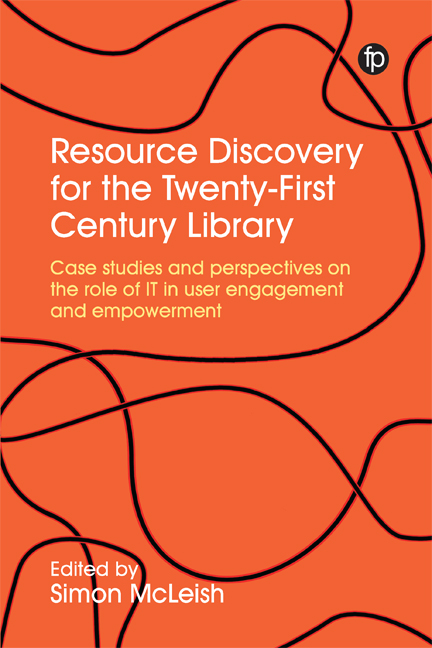Book contents
- Frontmatter
- Contents
- Figures and Tables
- Contributors
- Foreword: Library Discovery Directions
- 1 Introduction: Technology and Resource Discovery
- 2 Flipping the Catalogue: Taking Resource Discovery to the Next Level
- 3 Breaking the Record: Liberating Data into Knowledge at the National Library Board of Singapore
- 4 Case Study: Clearing Library Discovery-to-Access Pathways for IEEE Content
- 5 Case Study: Putting Discovery at the Heart of the Library Experience
- 6 Investigating Resource Discovery Needs at the University of Oxford
- 7 ‘Why Can’t you Just Use Google?’
- 8 Exposing Collections and Resources Effectively
- 9 Open Source Discovery using Blacklight at the University of Hull
- 10 A World of Curated Knowledge: Leveraging the Wider Semantic Web to Enhance Library Discovery
- 11 Cultural Discovery: Trends and Futures
- 12 Discovering the Future
- Editorial Afterword
- Index
Editorial Afterword
Published online by Cambridge University Press: 23 July 2020
- Frontmatter
- Contents
- Figures and Tables
- Contributors
- Foreword: Library Discovery Directions
- 1 Introduction: Technology and Resource Discovery
- 2 Flipping the Catalogue: Taking Resource Discovery to the Next Level
- 3 Breaking the Record: Liberating Data into Knowledge at the National Library Board of Singapore
- 4 Case Study: Clearing Library Discovery-to-Access Pathways for IEEE Content
- 5 Case Study: Putting Discovery at the Heart of the Library Experience
- 6 Investigating Resource Discovery Needs at the University of Oxford
- 7 ‘Why Can’t you Just Use Google?’
- 8 Exposing Collections and Resources Effectively
- 9 Open Source Discovery using Blacklight at the University of Hull
- 10 A World of Curated Knowledge: Leveraging the Wider Semantic Web to Enhance Library Discovery
- 11 Cultural Discovery: Trends and Futures
- 12 Discovering the Future
- Editorial Afterword
- Index
Summary
to the chapter …
Other authors and I hope that the above chapter is a fun but thought-provoking way to end a book on discovery. Some of the ideas in it may seem outlandish, but even as we were writing them, we could see them resonate with current news stories (the coverage of Alexa laughing could almost have been another scenario, and there always seem to be stories about manipulating fake news and chatbots being led astray by human beings – or taking jobs away from them). Discovery is already changing fast, and the research and learning it underpins is also rapidly developing.
… and to the book
Discovery and the underlying data which supports it are closely allied, and the forms of the objects to be discovered are also important. While some of the scenarios in Chapter 12 may seem to be more about the evolution of research practice, such changes would have an immense effect on how the outputs of research are discovered. Recent suggestions on replacements for the academic paper (Andrus, 2018; Somers, 2018; among others) suggest that a more fluid, nuanced, multimedia – or even executable – format for scholarly communication will become prevalent. This clearly would not fit well with today's static indexes in bibliographic databases mechanisms for discovery: how would services need to change to keep up? Are artificially intelligent curation and personal discovery bots the answer? Or will future discovery use something else, not yet thought up?
As editor, working on this book has brought home to me even more just how important discovery is to teaching, learning and research, and thus how key the development of discovery services is to the future of academic endeavour. Perhaps because of my role as a facilitator of discovery services I am biased, but it seems to me that resource discovery is the purpose of existence for libraries today: there is no point to a library if its contents (and, nowadays, subscribed resources) are unable to be found by students and researchers.
It is an exciting and challenging time to be working in this field – and the one thing which is certain is that it will not stop being either for a while to come.
- Type
- Chapter
- Information
- Resource Discovery for the Twenty-First Century Library , pp. 190 - 194Publisher: FacetPrint publication year: 2020



